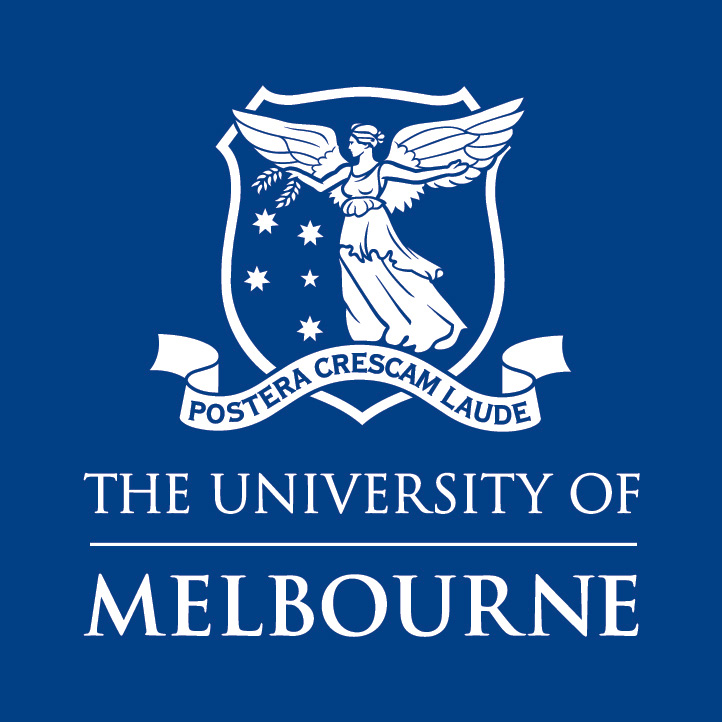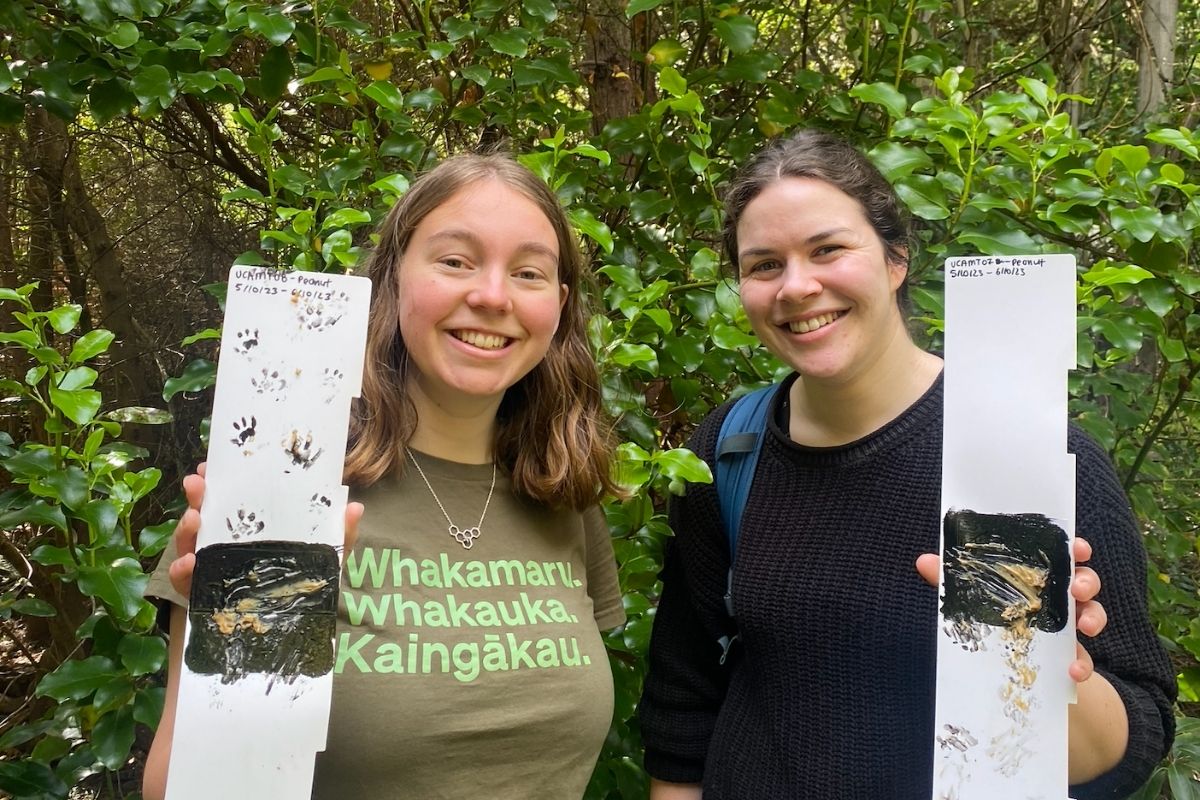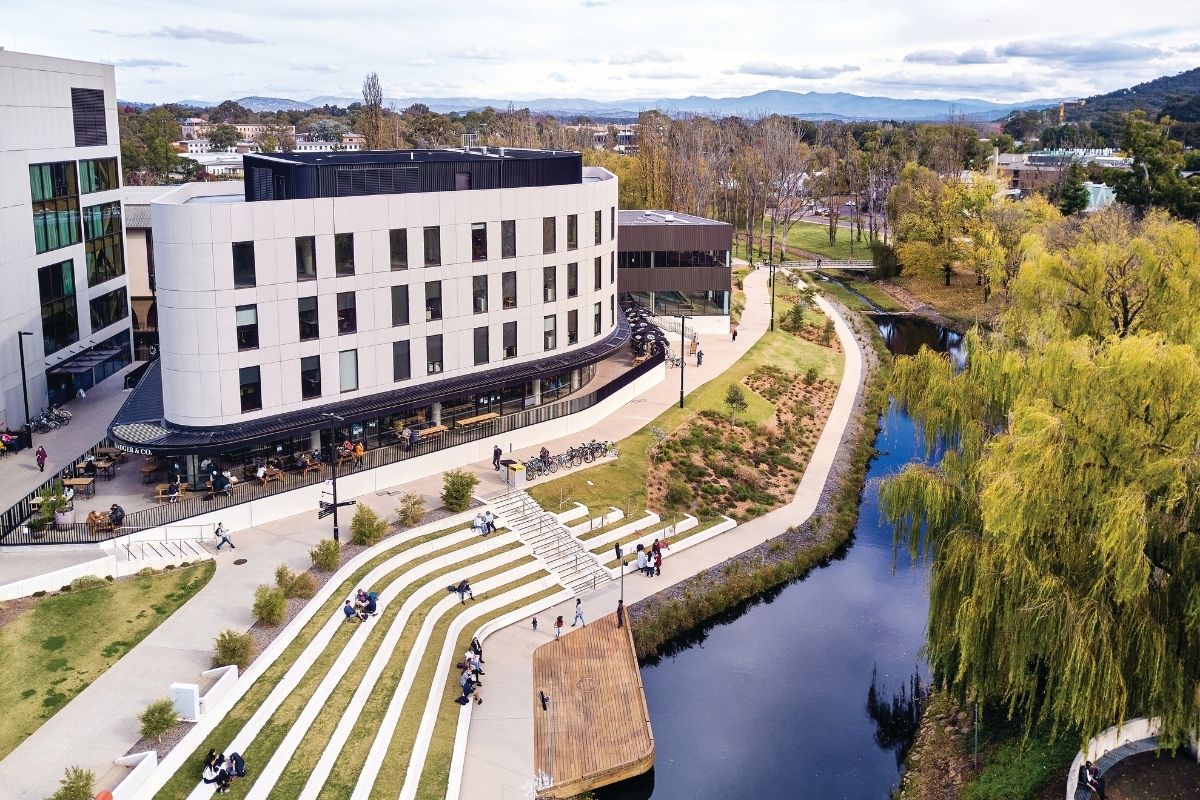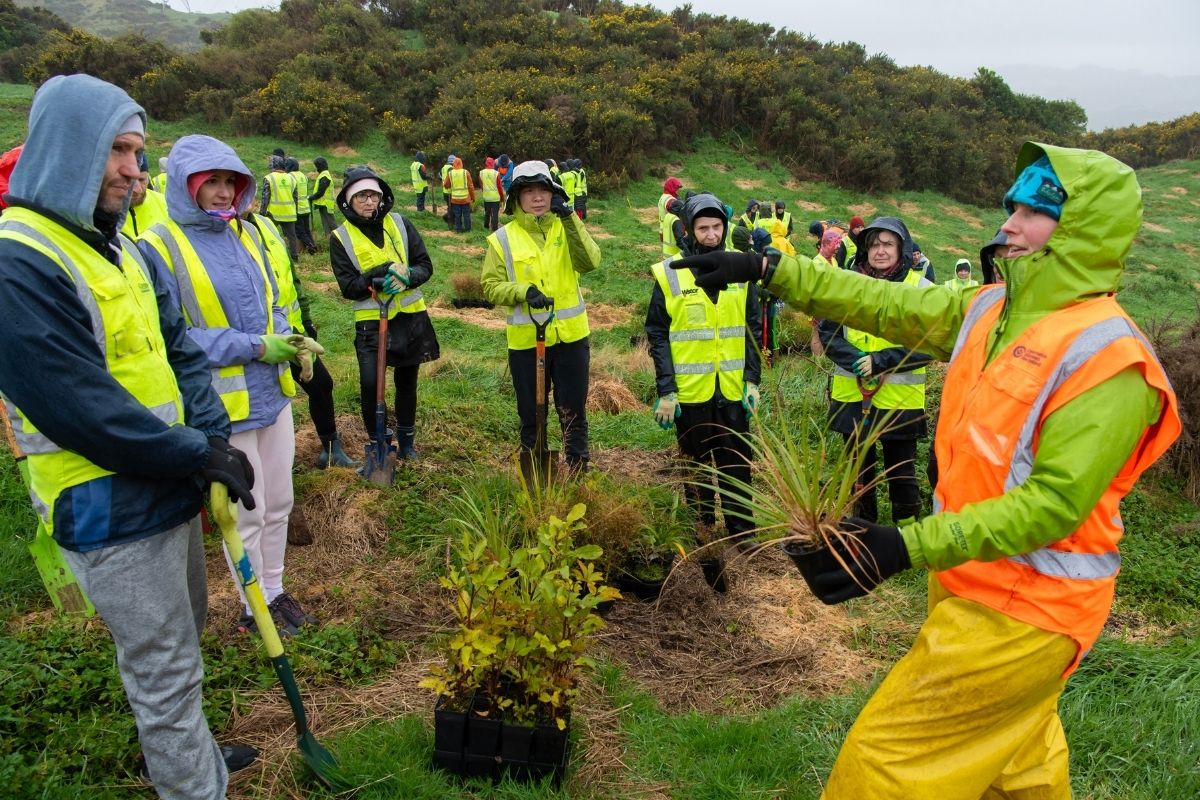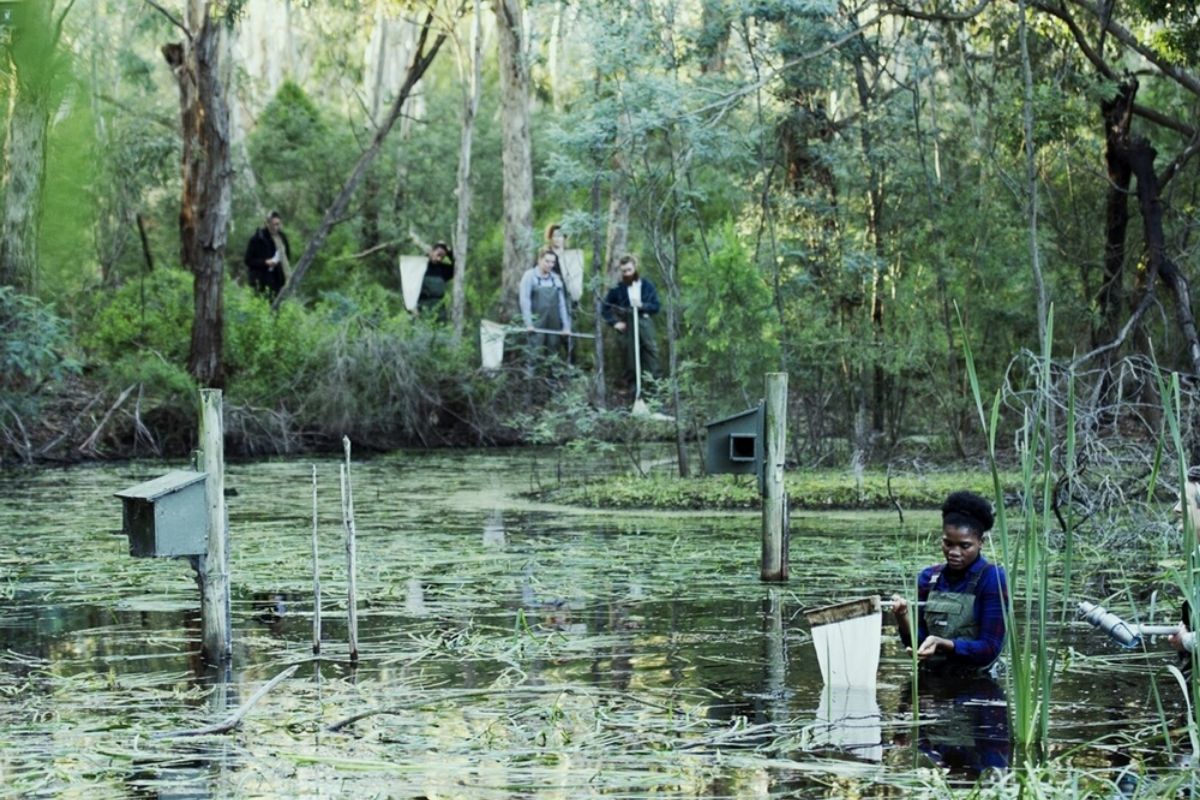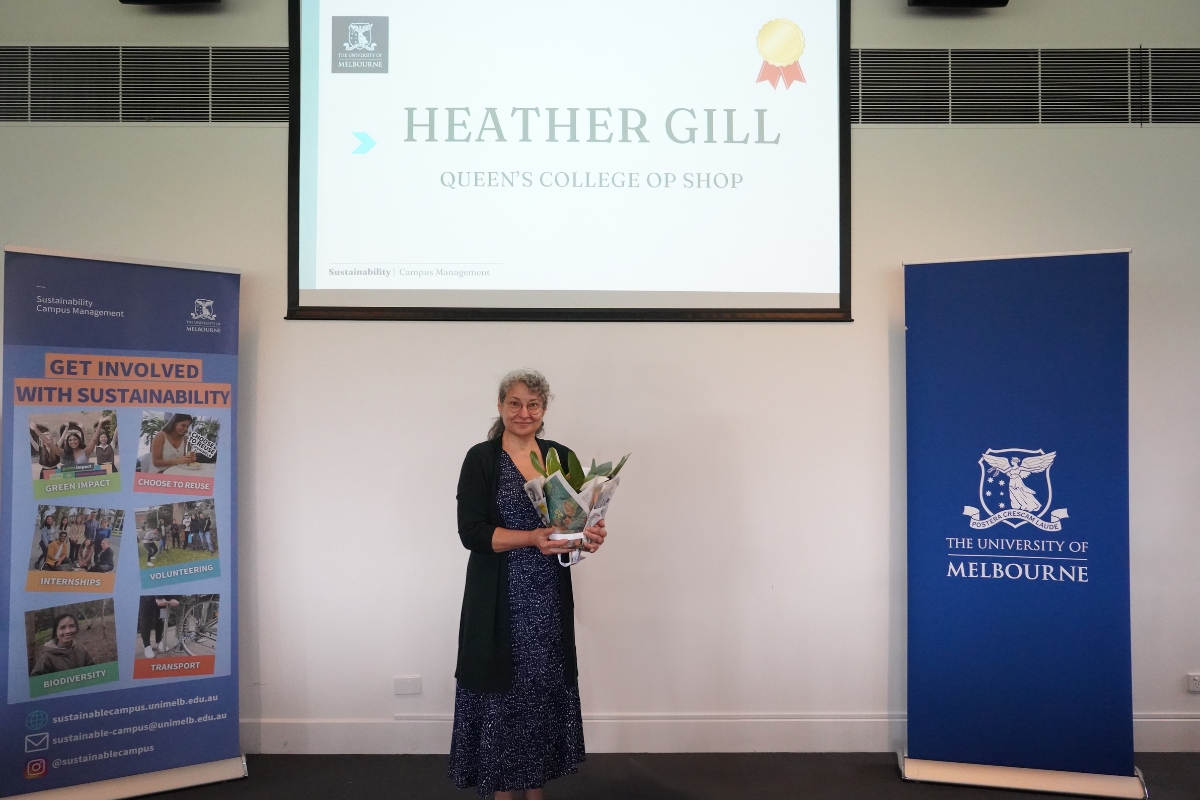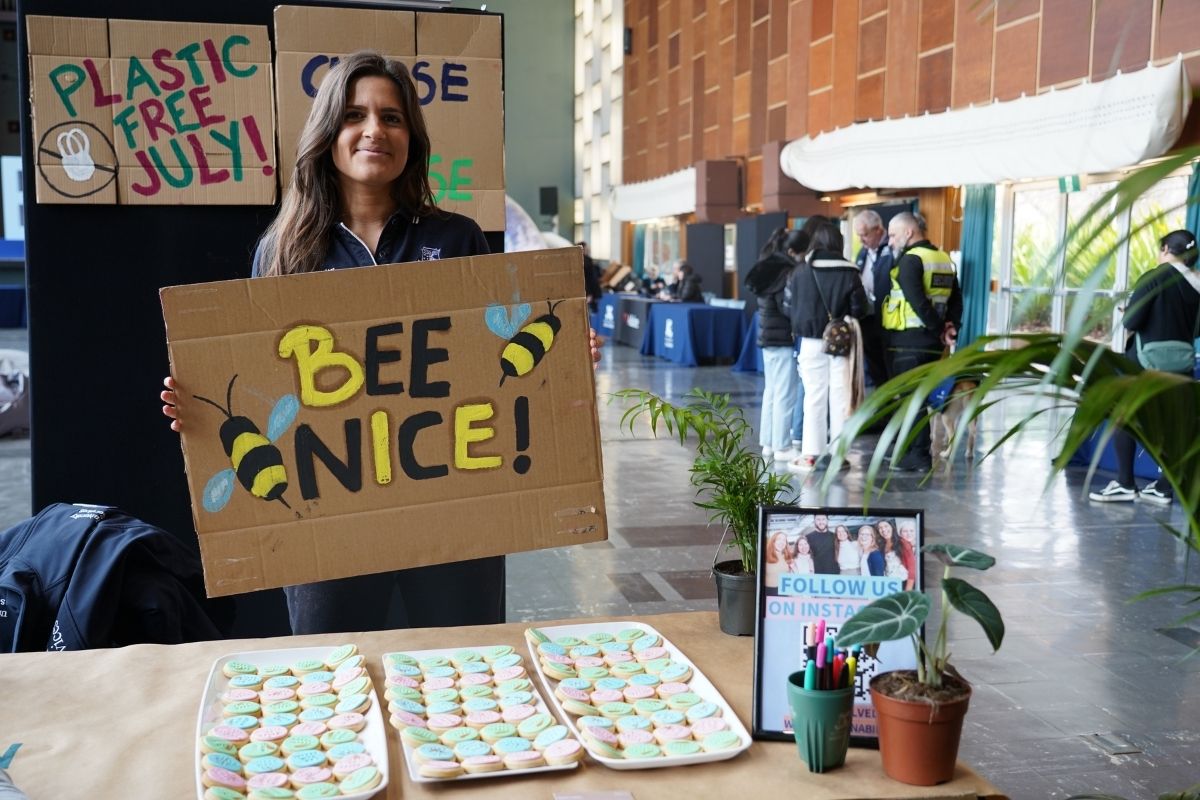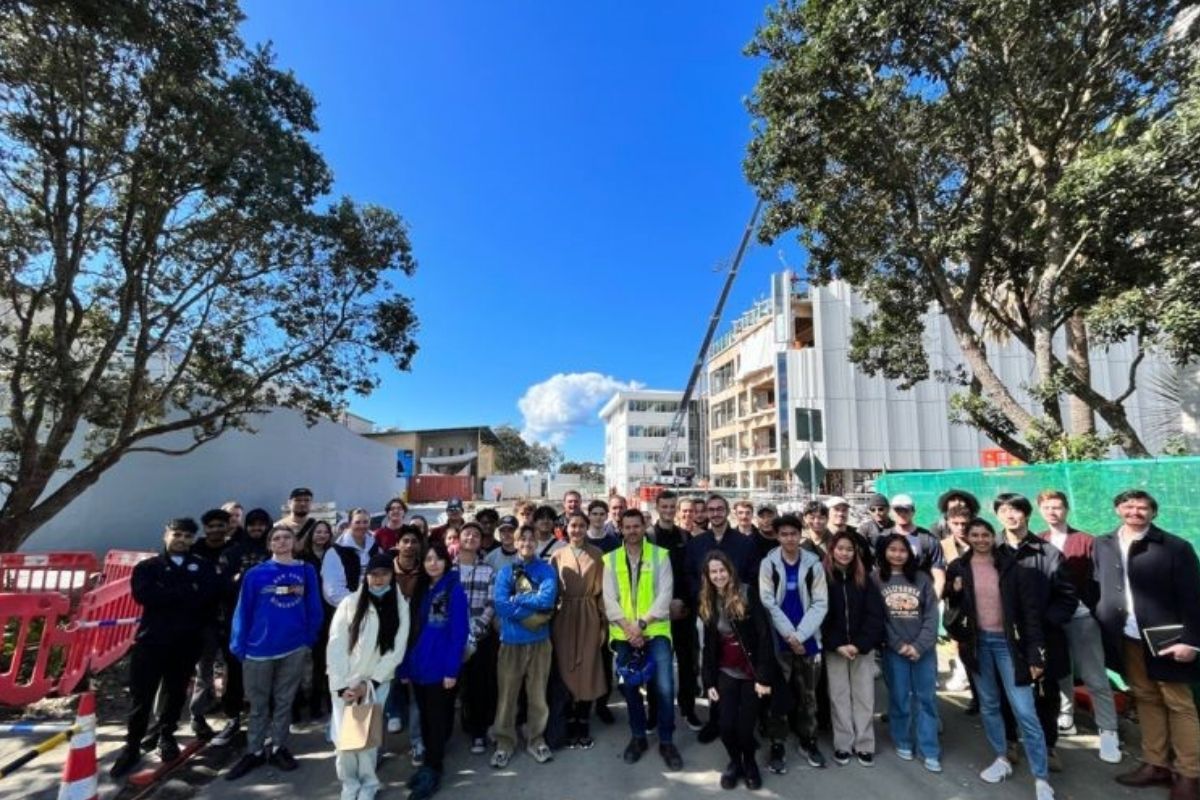Highly Commended/Nature Positive category
The University of Melbourne’s “Understanding, Protecting & Enhancing Biodiversity: The Biodiversity Baseline Data Project (BBDP)” is an ambitious initiative aimed at quantifying and enhancing biodiversity across the University’s eight campuses. Launched in 2019, the project was designed to support the University’s commitment to achieving no-net-loss of on-campus biodiversity by 2025 and a net-gain by 2030. The BBDP has developed seven key biodiversity metrics that provide the University with a deeper understanding of the biodiversity that occupies each of its eight campuses. This data-driven approach enables targeted actions to protect and enhance biodiversity, making the BBDP a pioneering project in the higher education sector.
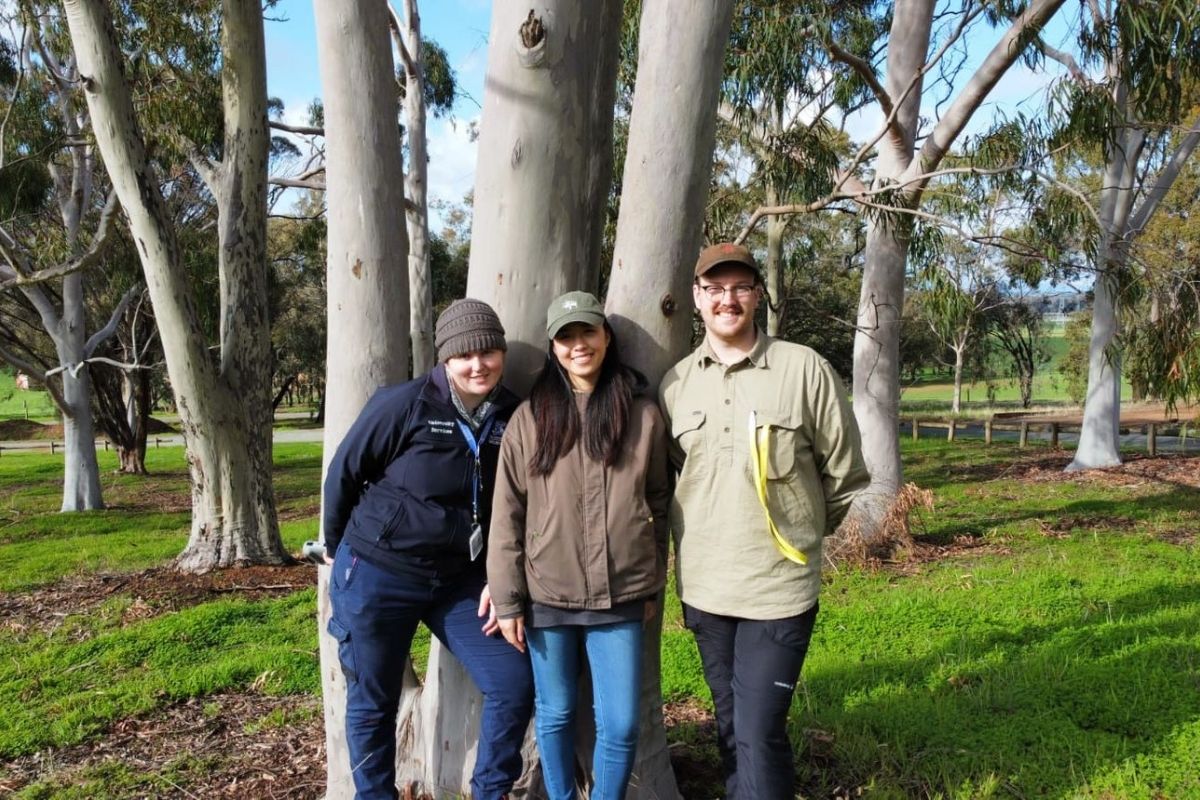
Environmental and Social Benefits
- Enhanced Biodiversity: The BBDP has already led to significant on-campus biodiversity improvements, including the planting of over 3,200 plants across multiple campuses and additional resourcing to aid in the ecological restoration of the Dookie Bushland Reserve. These efforts directly contribute to the University’s goals of achieving a net-gain in biodiversity by 2030.
- Data-Driven Conservation: The project’s seven biodiversity metrics, which include plantable area, number of understorey plant species, tree canopy cover, and fauna and fungi species, provide a robust framework for monitoring and improving biodiversity. This data is crucial for making informed decisions on biodiversity management and enhancing ecosystem services.
- Community Engagement: The initiative has engaged over 200 volunteers in biodiversity-related activities, including student-led planting days and citizen science projects. These activities not only contribute to biodiversity enhancement but also foster a strong connection between the university community and the natural environment.
Leadership and Engagement
- Collaborative Development: The BBDP is a collaborative effort involving students, staff, academics, and external partners. This collaboration has enabled the integration of biodiversity data into curriculum activities, providing students with practical experience in conservation and data analysis.
- Sector Leadership: The University of Melbourne has demonstrated leadership in biodiversity conservation within the higher education sector by sharing the BBDP’s methodologies and outcomes at various conferences and through networks like the ACTS Biodiversity Working Group. The University’s commitment to transparency is further evidenced by the public availability of project data through interactive dashboards.
- Student Involvement: The project has provided over 2,600 hours of internship opportunities for students, helping them develop valuable skills in ecology, Geographic Information Systems (GIS), and environmental management. These opportunities enhance student employability and foster a new generation of environmental stewards.
Significance to the Sector
- Innovative Metrics: The BBDP’s development of seven comprehensive biodiversity metrics is a significant innovation in the sector, providing a replicable model for other institutions. These metrics allow for a detailed understanding of biodiversity at multiple levels, from individual plant species to overall canopy cover, setting a new standard for biodiversity monitoring in the tertiary sector.
- Knowledge Sharing: The University has actively shared its findings and methodologies with other institutions, contributing to the global effort to address the biodiversity crisis. The project’s success has been recognised by various national and international bodies, including the Nature Positive Universities Alliance.
- Replicable Framework: The BBDP’s approach, which leverages existing data and student involvement, is highly replicable. Other universities and organisations can adopt this framework to establish their own biodiversity baselines, contributing to global biodiversity conservation efforts.
Wider Societal Impact
- Public Education: The BBDP has raised public awareness of biodiversity through its online presence and public events, including BioBlitzes and webinars. These efforts educate the broader community about the importance of biodiversity and the role of urban environments in conservation.
- Global Relevance: The BBDP’s methodologies and outcomes have the potential to influence biodiversity monitoring and management practices beyond the university sector, particularly in urban areas where biodiversity is often overlooked. The project’s success in a highly urbanised context demonstrates its relevance to other sectors and geographies.
- Future-Proofing Biodiversity: By establishing a robust baseline and implementing ongoing monitoring, the BBDP ensures that the University of Melbourne’s biodiversity goals are met sustainably, contributing to the long-term resilience of campus ecosystems.
The University of Melbourne’s “Biodiversity Baseline Data Project” is a pioneering initiative that illustrates the University’s commitment to sustainability and biodiversity conservation. Through innovative metrics, strong leadership, and extensive community engagement, the project not only enhances on-campus biodiversity but also sets a new standard for the higher education sector. The BBDP’s impact extends beyond the University, offering a replicable model for biodiversity monitoring and management that can be applied globally, contributing to the broader goal of addressing the biodiversity crisis.
Top 3 learnings
Supported by

Category finalists
Nature Positive
Nature Positive
Climate Action/Highly Commended
Climate Action/Highly Commended
Nature Positive
Nature Positive
Diversity, Equity and Inclusion/Highly Commended
Diversity, Equity and Inclusion/Highly Commended
Nature Positive/Winners
Nature Positive/Winners
Highly Commended/Staff Champion
Highly Commended/Staff Champion
Highly Commended/Sustainability Leadership
Highly Commended/Sustainability Leadership
Past winners
Benefitting Society/Winners
Benefitting Society/Winners
Diversity, Equity & Inclusion in Sustainability/Winners
Diversity, Equity & Inclusion in Sustainability/Winners
Climate Action/Winners
Climate Action/Winners
Sustainability Institution of the Year/Winners
Sustainability Institution of the Year/Winners
Creating Impact/Winners
Creating Impact/Winners
Creating Impact/Winners
Creating Impact/Winners
Top 3 learnings
Highly Commended/Nature Positive category
The University of Melbourne’s “Understanding, Protecting & Enhancing Biodiversity: The Biodiversity Baseline Data Project (BBDP)” is an ambitious initiative aimed at quantifying and enhancing biodiversity across the University’s eight campuses. Launched in 2019, the project was designed to support the University’s commitment to achieving no-net-loss of on-campus biodiversity by 2025 and a net-gain by 2030. The BBDP has developed seven key biodiversity metrics that provide the University with a deeper understanding of the biodiversity that occupies each of its eight campuses. This data-driven approach enables targeted actions to protect and enhance biodiversity, making the BBDP a pioneering project in the higher education sector.

Environmental and Social Benefits
- Enhanced Biodiversity: The BBDP has already led to significant on-campus biodiversity improvements, including the planting of over 3,200 plants across multiple campuses and additional resourcing to aid in the ecological restoration of the Dookie Bushland Reserve. These efforts directly contribute to the University’s goals of achieving a net-gain in biodiversity by 2030.
- Data-Driven Conservation: The project’s seven biodiversity metrics, which include plantable area, number of understorey plant species, tree canopy cover, and fauna and fungi species, provide a robust framework for monitoring and improving biodiversity. This data is crucial for making informed decisions on biodiversity management and enhancing ecosystem services.
- Community Engagement: The initiative has engaged over 200 volunteers in biodiversity-related activities, including student-led planting days and citizen science projects. These activities not only contribute to biodiversity enhancement but also foster a strong connection between the university community and the natural environment.
Leadership and Engagement
- Collaborative Development: The BBDP is a collaborative effort involving students, staff, academics, and external partners. This collaboration has enabled the integration of biodiversity data into curriculum activities, providing students with practical experience in conservation and data analysis.
- Sector Leadership: The University of Melbourne has demonstrated leadership in biodiversity conservation within the higher education sector by sharing the BBDP’s methodologies and outcomes at various conferences and through networks like the ACTS Biodiversity Working Group. The University’s commitment to transparency is further evidenced by the public availability of project data through interactive dashboards.
- Student Involvement: The project has provided over 2,600 hours of internship opportunities for students, helping them develop valuable skills in ecology, Geographic Information Systems (GIS), and environmental management. These opportunities enhance student employability and foster a new generation of environmental stewards.
Significance to the Sector
- Innovative Metrics: The BBDP’s development of seven comprehensive biodiversity metrics is a significant innovation in the sector, providing a replicable model for other institutions. These metrics allow for a detailed understanding of biodiversity at multiple levels, from individual plant species to overall canopy cover, setting a new standard for biodiversity monitoring in the tertiary sector.
- Knowledge Sharing: The University has actively shared its findings and methodologies with other institutions, contributing to the global effort to address the biodiversity crisis. The project’s success has been recognised by various national and international bodies, including the Nature Positive Universities Alliance.
- Replicable Framework: The BBDP’s approach, which leverages existing data and student involvement, is highly replicable. Other universities and organisations can adopt this framework to establish their own biodiversity baselines, contributing to global biodiversity conservation efforts.
Wider Societal Impact
- Public Education: The BBDP has raised public awareness of biodiversity through its online presence and public events, including BioBlitzes and webinars. These efforts educate the broader community about the importance of biodiversity and the role of urban environments in conservation.
- Global Relevance: The BBDP’s methodologies and outcomes have the potential to influence biodiversity monitoring and management practices beyond the university sector, particularly in urban areas where biodiversity is often overlooked. The project’s success in a highly urbanised context demonstrates its relevance to other sectors and geographies.
- Future-Proofing Biodiversity: By establishing a robust baseline and implementing ongoing monitoring, the BBDP ensures that the University of Melbourne’s biodiversity goals are met sustainably, contributing to the long-term resilience of campus ecosystems.
The University of Melbourne’s “Biodiversity Baseline Data Project” is a pioneering initiative that illustrates the University’s commitment to sustainability and biodiversity conservation. Through innovative metrics, strong leadership, and extensive community engagement, the project not only enhances on-campus biodiversity but also sets a new standard for the higher education sector. The BBDP’s impact extends beyond the University, offering a replicable model for biodiversity monitoring and management that can be applied globally, contributing to the broader goal of addressing the biodiversity crisis.
Supported by

Related finalists
Nature Positive
Nature Positive
Climate Action/Highly Commended
Climate Action/Highly Commended
Nature Positive
Nature Positive
Diversity, Equity and Inclusion/Highly Commended
Diversity, Equity and Inclusion/Highly Commended
Nature Positive/Winners
Nature Positive/Winners
Highly Commended/Staff Champion
Highly Commended/Staff Champion
Highly Commended/Sustainability Leadership
Highly Commended/Sustainability Leadership
Other finalists
Climate Action

Driving Towards Tomorrow’s Campus with Vehicle-to-Grid EV Technology
As part of Flinders University’s drive to innovate and become a leader in climate action, the University launched its Vehicle-to-Grid (V2G) initiative. This involved installing and maintaining 20x V2G and smart chargers for its growing electric vehicle fleet. Leveraging 100% renewable energy generated by ENGIE’s Willogoleche Wind Farm and Flinders University’s solar power systems, this enables the storage of renewable energy in EV batteries to be discharged on campus during peak demand periods. Hence, allows for these EV fleets to operate as a Virtual Power Plant (VPP) to deliver peak demand management and optimization of behind-the-meter generation.
Overall, this initiative demonstrates the reliability and scalability of bi-directional and uni-directional smart-charging systems for EVs in reducing GHG emissions while facilitating teaching, research, and innovation opportunities. Moreover, it exemplifies a sustainable and innovative solution to scale energy storage technology and increase renewables.
Sustainability Champion – Staff/Winners

Brandan Espe
Environmental Officer / Acting Grounds Supervisor
Brandan has brought over 50 federally listed Endangered species of plant into the James Cook University living collection, many of which have never been cultivated and are found in no other collection in the world.
Of these, over half have been sustainably wild collected, inclusive of field and clone data, so they can be used for ongoing conservation, research and teaching, the remaining being sourced from private and partner organisations through favours of service or trades.
He personally funded the project from 2019-2022, until funding was awarded for the program due to its success, with the program now being engrained into the Universities landscapes for ongoing management should he leave JCU, creating a threatened species legacy collection.
The program has now expanded beyond this, with an additional 48 species now funded for further addition, some of which are only known from less than 5 sightings in history.
Student Engagement

Sustainability Leaders creating real impact!
La Trobe created a unique Sustainability Leaders volunteering program to increase engagement with students on campus and empower them to act against waste and promote sustainability. It included the following initiatives:
- Promoting the reusable crockery implementation,
- Increasing knowledge action of other students on campus to diversion comingled recycling and organic waste from landfill.
- Focus on waste audits and data,
- Improved signage through new waste posters for students living on campus.
- Collaboration with Cirka (our cleaning and waste partner) to create a waste wall and;
- Learning all things sustainability (net zero, biodiversity, waste, reusables, engagement)
These initiatives yielded significant results and with a reduction in waste contamination by almost 40% at the residential buildings and engagement with over 80 groups of people for the Reusable Revolution.
Creating Impact

Where knowledge meets habits: Empowering students for a sustainable tomorrow
Our online Sustainability Challenges offer participants an engaging, self-paced learning experience centered around a specific United Nations Sustainable Development Goal (UNSDG). Requiring minimal resourcing and at zero-cost to participants, we’ve created replicable, compact, scalable, and impactful learning opportunities that result in real impact.
The Challenges follow a structured process that moves participants from knowledge gain to simple action to celebration, to establish small but mighty habits relating to waste and carbon emissions. This approach recognises that knowledge alone is often insufficient to drive behaviour change, and that ease of action and celebration are crucial components in creating sustainable habits.
Sustainability Champion – Staff/Winners

Catherine (CeeJay) Donovan
Veterinary nurse – Anaesthesia
From establishing the Massey Vet School Green Team to leading impactful initiatives, my commitment to environmental sustainability has been making waves. With the help of my team, I have accomplished numerous small, yet meaningful actions, including integrating a sustainability lecture for final year vet students and implementing battery recycling alongside rechargeable battery use. Our larger projects encompass the introduction of green waste and soft plastics recycling bins, an energy audit resulting in power-saving measures, and playing a part in a successful rubbish audit. I spearheaded the ‘6 in 6’ campaign, empowering individuals with six simple steps for workplace sustainability. Through the SustainaVet social media pages I help to educate and inspire peers nationwide. As the Massey School of Veterinary Science sustainability champion, I had the privilege of speaking at the annual veterinary conference on sustainability in clinical practice. Currently I’m conducting pioneering research on responsible cat waste disposal. Together, we’re forging a greener future, one initiative at a time.
Sustainability Champion – Student

Louis Walmsley
SDG Coordinator Monash Association of Sustainability, Office Bearer Monash Student Association’s Environmental and Social Justice Department, Masters of Environment and Sustainability Student
Louis is an exceptional student sustainability leader at Monash University. His passion and dedication to sustainability have made a significant impact on the community. Louis’s values revolve around sustainability, which is evident upon meeting him. He actively participates in various sustainability groups, demonstrating his commitment to creating a more environmentally conscious society.
One of Louis’s notable involvements is with Precious Plastic Monash, where he organizes remarkable events and fosters collaboration among like-minded individuals, student groups, and staff. His contributions to the Monash Association of Sustainability have allowed him to conduct valuable research on plastic usage and climate action, resulting in positive changes within the university.
Through his work with the Monash Student Association, Louis has engaged hundreds of students in fun and interactive sustainability initiatives. He took the initiative to organize a sustainability food fair, which was one of the largest sustainability-related events held at Monash post-COVID. This accomplishment is a true testament to Louis’s hard work and creativity.
Louis is an outstanding student leader whose efforts in sustainability have had a lasting impact on Monash University and its community. His inspiring nature resonates with everyone who knows him.

